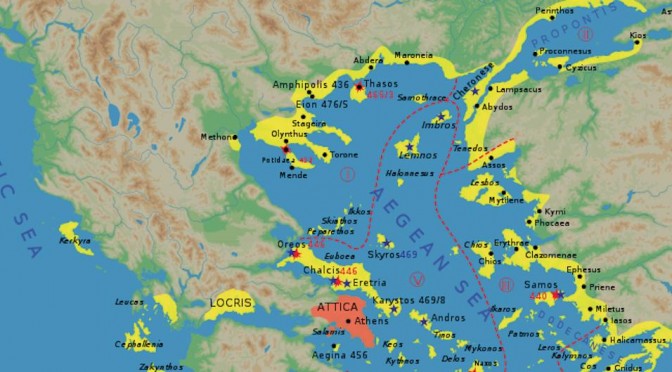Egypt used the Greeks to distract the Persians and in the process triggered the birth of what we call civilisation.
The Disaster
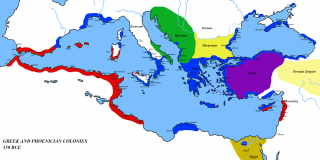 The vacuum left by the collapse of the Minoan civilisation was rapidly filled, first by the Myceans and then by the Greeks. In Egypt the experimentation with Persian rule had been nothing short of disastrous for the priests. A legitimate strain Of Pharohs, possibly tighter bred than is obvious from the available records, ruled Persia. Why was the Persian strain unaceptable in Eqypt ? Almost certainly because they had adopted the Zarathrustran religion which challenged the role of the priests and therefore threatened the whole Egyptian system. The Priests looked around for a better solution.
The vacuum left by the collapse of the Minoan civilisation was rapidly filled, first by the Myceans and then by the Greeks. In Egypt the experimentation with Persian rule had been nothing short of disastrous for the priests. A legitimate strain Of Pharohs, possibly tighter bred than is obvious from the available records, ruled Persia. Why was the Persian strain unaceptable in Eqypt ? Almost certainly because they had adopted the Zarathrustran religion which challenged the role of the priests and therefore threatened the whole Egyptian system. The Priests looked around for a better solution.
Greek potential
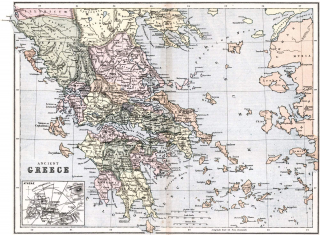 What they needed was someone who could take control of the Persian nation and change its allegiance to the Zarathrustan creed. There were various city states having such as Rome, Carthage, Sparta, Athens, and Epirus but none of them appeared to be a match for Persia, nevertheless they were all considered as potential partners( or puppets). Looked at from a Mediterranean perspective the city states of Greece had the most extensive holdings. But there was a problem with Greece , it was not a nation; every individual city state was independant, every colony established by those states was also independant.
What they needed was someone who could take control of the Persian nation and change its allegiance to the Zarathrustan creed. There were various city states having such as Rome, Carthage, Sparta, Athens, and Epirus but none of them appeared to be a match for Persia, nevertheless they were all considered as potential partners( or puppets). Looked at from a Mediterranean perspective the city states of Greece had the most extensive holdings. But there was a problem with Greece , it was not a nation; every individual city state was independant, every colony established by those states was also independant.
Racial Differences
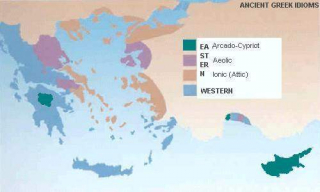 The Greeks were not even a single people. The two dominant cities being of different racial groupings. Athens was populated by Ionians and Sparta by Dorics.
The Greeks were not even a single people. The two dominant cities being of different racial groupings. Athens was populated by Ionians and Sparta by Dorics.
For a long period they did not have a single language. Athens and Sparta grew to prominence by subjugating neighbouring city states. The Greek “Nation” therefore grew from a large number of relatively small city states. This initial graphic was deliberately chosen to show just how complex it was. The Greek peninsula was very mountainous. The City States thrived in valleys and plains separated from each other by mountains.
Homer’s Gods
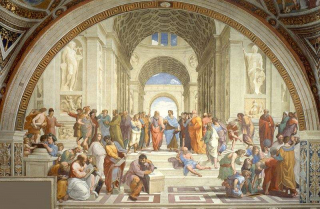 Around 900 BC the popularity of the works of Homer helped to unify the language. Amongst other legends Homer told stories of the Gods. As time passed there were attempts to reconcile the major gods between Sparta, Athens, and Thebes; eventually between Greece and Egypt. over time many of the prominent Greek Heroes were said to be descended from the Gods.
Around 900 BC the popularity of the works of Homer helped to unify the language. Amongst other legends Homer told stories of the Gods. As time passed there were attempts to reconcile the major gods between Sparta, Athens, and Thebes; eventually between Greece and Egypt. over time many of the prominent Greek Heroes were said to be descended from the Gods.
The rise of Athens
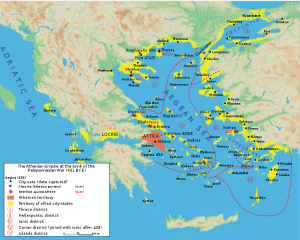 Our modern respect for the famed Greeek philosophy is based on what happened in one state, Athens. As competition between the states became ever greater, there were ever shifting alliances. In time the various states banded together for mutual defence and trading advantage.
Our modern respect for the famed Greeek philosophy is based on what happened in one state, Athens. As competition between the states became ever greater, there were ever shifting alliances. In time the various states banded together for mutual defence and trading advantage.
Eventually alliances were formalised as “Leagues.” The Ionian league was headed by Athens but covered little of mainland Greece, being mainly concerned with the islands and coastal areas of the Agean sea .
A fragmented structure
The Thessalian League covered the eastern part of the mainland. Sparta itself was the leading state in the Peloponnesian League and the later Achean League. Macedonia and Epirus were much closer to the modern concept of a nation. The Macedonians were Dorians, the same race as the Spartans but Epirus was Illirican. These two states lay beyond the area involved in the leagues and interstate politics. Both the leagues were opposed to Macedonian ambitions for expansion.
It was this fragmented structure which Egypt chose to pursue its interests.
Democracy?
The Egyptians must have been desperate. They were seeking alliances with peoples whose ethical standards were appalling. Athens was an example of how democracy can go badly wrong. Only the establishment contributed to political discussion, women were disenfranchised and discriminated against and the economy was based on the use of slave labour. The learned discourse on the organisation of the state, which we so admire today, never seriously challenged these injustices. In Sparta the final stage of a man’s education was that he should strangle a slave. The unfortunate citizens of competitive city states were reduced to this permanent slave status. A Sparta declared war on their own slaves every year as a way of justifying this brutal treatment. Spartan men never performed any productive work. All farming and industrial activity was consigned to the slaves.
Sexual Discrimination
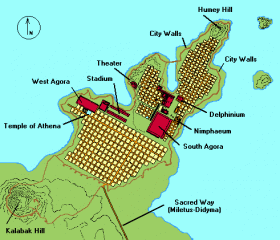 [/tab]The task the egyptian priests set themselves was a difficult one. If the same practices of infiltration by marriage which had been used in Persia were to be pursued in Greece then the status of women had to be changed. Social practice in Athens was grossly discriminatory against women. In Athens women were not able to vote or possess property. They were not even counted as citizens. They came into the category of a valued commodity as they could produce the next generation. In Sparta, despite its austere, militaristic society, it would have been easier, for women were allowed to play a part in social and political life. Probably from the very beginning the Egyptian target was Greek unity, to produce a cohesive force which could defeat Persia.
[/tab]The task the egyptian priests set themselves was a difficult one. If the same practices of infiltration by marriage which had been used in Persia were to be pursued in Greece then the status of women had to be changed. Social practice in Athens was grossly discriminatory against women. In Athens women were not able to vote or possess property. They were not even counted as citizens. They came into the category of a valued commodity as they could produce the next generation. In Sparta, despite its austere, militaristic society, it would have been easier, for women were allowed to play a part in social and political life. Probably from the very beginning the Egyptian target was Greek unity, to produce a cohesive force which could defeat Persia.
It would appear that they chose Miletus.
Why Miletus?
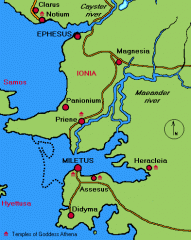 Miletus is on the western, Agean shore of Anatolia (now Turkey) and was part of the Ionian league. Miletus was however perhaps the worst example of anti feminism which could be found. A wife was not allowed to eat at the same table as her husband and was not even allowed to address him by his name.
Miletus is on the western, Agean shore of Anatolia (now Turkey) and was part of the Ionian league. Miletus was however perhaps the worst example of anti feminism which could be found. A wife was not allowed to eat at the same table as her husband and was not even allowed to address him by his name.
Thales
Despite this, the first identification of inspired Philosopy, Science and Mathematics in Greek society came from a person called Thales who lived Miletus. Thales was an immigrant ” from the east” and was said to have recieved instuction from Egyptian priests and visited Egypt. He expounded theories on the occurence of natural phenomema, which excluded the will of the gods, therby undermining the status of Homer’s Gods. In 500 BC he took part in an attempted invasion of Persia and when that failed negotiated independance for Miletus and its colonies when the rest of the Greek city states in Anatolia were taken over by Persia. He may then have performed a role in the government of Milates. He did much of what might be expected of an Egyptian agent.
It was from Miletus that events unfolded which ultimately changed the history of the western world , amazingly one of the chief agents of change was a woman.
